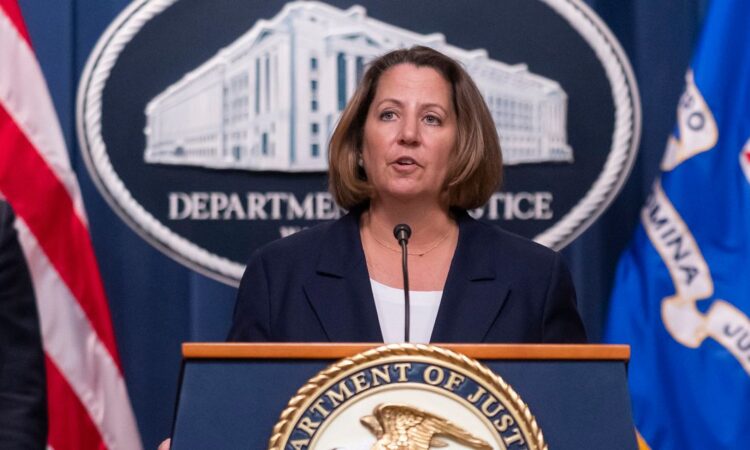Crypto Platform Bitzlato Charged With Laundering More Than $700 Million of Illicit Money

U.S. authorities designated cryptocurrency exchange Bitzlato Ltd. as a primary money-laundering concern and charged its founder for allegedly facilitating money laundering for criminals.
The Treasury Department designated Bitzlato under a section of the USA Patriot Act, a law used to combat money laundering and terrorist financing, for allegedly laundering illicit funds for ransomware actors based in Russia. This type of action, a rarely used so-called death-knell sanction that cuts off the entity from the U.S. financial system, has been used mainly in the past against banks and other financial institutions and in most cases has forced the institution to close.
Bitzlato, which is based in Hong Kong but operates globally, allegedly exchanged more than $700 million in cryptocurrency with Hydra Market, a darknet marketplace that was the largest in the world before it was shut down in April 2022, the U.S. Justice Department said. Bitzlato also received more than $15 million of ransomware proceeds, the Justice Department said.
Anatoly Legkodymov,
the founder and majority owner of Bitzlato, was arrested Tuesday night in Miami. Mr. Legkodymov is a 40-year-old Russian national who lives in Shenzhen, China, according to the Justice Department.
Joel DeFabio, a federal crime attorney in Miami, has been retained to represent Mr. Legkodymov, according to court records. Mr. DeFabio didn’t respond to a request for comment.
Mr. Legkodymov made his first appearance Wednesday at a federal court in Florida and was ordered to be detained, according to a spokesman for the U.S. Attorney’s Office for the Eastern District of New York, which brought the prosecution alongside the Justice Department in Washington. Mr. Legkodymov faces a charge of operating an illegal money-transmitting business and could get up to five years in prison if convicted, according to the Justice Department.
Concurrent with the U.S. action, French authorities have taken their own enforcement steps, including closing Bitzlato’s digital infrastructure and seizing its cryptocurrency.
U.S. prosecutors said Bitzlato lacked effective know-your-customer procedures to check users’ identity as required by U.S. anti-money-laundering laws and did substantial business with U.S.-based customers despite claiming not to accept users from the U.S.
Representatives for Bitzlato couldn’t be reached for comment. Bitzlato’s website shows that it’s been seized by French authorities.
“Today the Department of Justice dealt a significant blow to the cryptocrime ecosystem,” Deputy Attorney General
Lisa Monaco
said Wednesday. “Today’s actions send the clear message: Whether you break our laws from China or Europe—or abuse our financial system from a tropical island—you can expect to answer for your crimes inside a United States courtroom.”
Deputy Treasury Secretary
Wally Adeyemo
said authorities continue to investigate whether Bitzlato was used to help circumvent sanctions that were imposed on Russia over its invasion of Ukraine. The enforcement action should serve as a warning against the use of crypto to launder illicit funds and as a reminder that U.S. authorities are ready to act if they see it occur, he said, adding that there could be other charges against Bitzlato or its founder.
“The message [to those using crypto tools to circumvent Russia sanctions]: We will, in collaboration and coordination with our allies and with the DOJ, find you and go after you and take actions against you with the tools at our disposal,” Mr. Adeyemo said at Wednesday’s press conference announcing the enforcement action.
The Justice Department said enforcement actions imposed in recent weeks against the crypto industry have shown that investments in improving its expertise in the sector are paying off. Ms. Monaco told The Wall Street Journal last month that a surge of Justice Department resources into cryptocurrency investigations more than a year ago helped prosecutors quickly charge FTX founder
Sam Bankman-Fried
and the move augurs a spate of aggressive enforcement actions ahead. The Justice Department is coordinating cryptocurrency enforcement efforts through a 25-member national team, she added.
The enforcement action against Bitzlato comes as the crypto industry continues to face scrutiny following upheaval in the sector last year. U.S. prosecutors charged Mr. Bankman-Fried last month with eight counts of fraud after FTX filed for bankruptcy in November. Mr. Bankman-Fried is under house arrest at his parents’ California home as he faces federal fraud charges, to which he has pleaded not guilty.
Bitzlato was a little-known exchange before Wednesday’s action. The Financial Crimes Enforcement Network, the Treasury unit tasked with combating money laundering, said in its order against Bitzlato that the exchange “represents a limited percentage of daily” crypto transfers by U.S. and international standards.
FinCEN said that by April 2022, Bitzlato had a daily bitcoin balance that was 0.0185% of the largest U.S.-based crypto exchange. Although FinCEN didn’t name the largest exchange,
Coinbase Global Inc.
is ranked as the biggest in the U.S., according to research site CoinMarketCap.com.
A blog post from last year by blockchain analytics firm Chainalysis Inc. said Bitzlato received about $2 billion worth of cryptocurrency between 2019 and 2021, and nearly half of that value was considered illicit or risky.
The enforcement action against Bitzlato appears to have come as a shock to its users. Minutes after the Justice Department’s announcement, a Russian-language Telegram group for Bitzlato users filled up with complaints about the exchange’s shutdown and the U.S. authorities’ actions.
“They took Hydra, looks like Bitzlato too, the USA is squeezing Russia from all sides,” a user posting under the handle Daniel Yanson wrote in the group, which has more than 5,500 members.
Another user, with the handle Non, wrote: “Is this even legal? Let’s say the owner did launder something there. What about ordinary people?…Does the USA just take their money or what?”
—Ian Talley contributed to this article.
Write to Mengqi Sun at [email protected] and Alexander Osipovich at [email protected]
Copyright ©2022 Dow Jones & Company, Inc. All Rights Reserved. 87990cbe856818d5eddac44c7b1cdeb8






